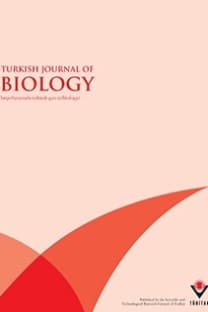Medine GÜLLÜCE, Meryem ŞENGÜL, Ahmet ADIGÜZEL, İsa KARAMAN, Ayşe Aydan KARA, Hatice ÖĞÜTÜÇÜ, Fikrettin ŞAHİN
Antimicrobial effects of Verbascum georgicum bentham ewtract
Verbascum georgicum Bentham'ın metanol ekstraktının antimikrobiyal özelliği in-vitro ortamda araştırıldı. Bir maya 4 fungus 56 bakteri türüne ait 143 mikroorganizma disk-difüzyon ve mikrodilüsyon yöntemleri kullanılarak test edildi. Verbascum georgicum Bentham'ın metanol ekstraktının Candida albicans izolatlarının hepsine ve Bacillus amyloliquefaciens, B. subtilis, B. cereus, B. pumilus, B. megaterium, B. lentimorbus, B. licheniformis, Pseudomonas putida, P. syringae, Escherichia coli türlerini içeren 10 farklı bakteri türünün 17 suşunda 37.5-300 µg/mL konsantrasyonlarında inhibisyon zonları oluşturduğu tesbit edildi. Bununla birlikte test edilen 4 fungus türünün izolatlarında antifungal aktivite göstermemiştir. Böylece, bu sonuçlara göre Verbascum georgicum Bentham'ın metanol ekstraktının antimikrobiyal özellikte bileşikler içerdiği ve bunun yeni ilaç geliştirilmesinde antimikrobiyal ajan olarak kullanılabileceği önerilebilir.
Verbascum georgicum Bentham ekstraktının antimikrobial etkileri
The methanol extract of Verbascum georgicum Bentham (Scrophulariaceae) was investigated for its in-vitro antimicrobial properties. A total of 143 microorganisms belonging to 56 bacteria and 4 fungi and a yeast species were studied using the disk-diffusion method and microdilution assays. The results indicated that the methanol extract of V. geopgicum had an inhibitory effect on the growth of all Candida albicans isolates and 17 strains in 10 different species of bacteria, namely Bacillus amyloliquefaciens, B. subtilis, B. cereus, B. pumilus, B. megaterium, B. lentimorbus, B. licheniformis, Pseudomonas putida, P. syringae and Escherichia coli, at different concentrations ranging from 37.5 to 300 µg/ml. However, it did not show antifungal activity against the isolates of the 4 fungal species tested. Thus, the results suggest that V. georgicum extract possesses compounds with antimicrobial properties that might be utilized for developing new drugs
___
- 1. Özturk M, Özcelik H. Doğu Anadolu'nun şifalı Bitkileri. SİSKAV Vakfı, Semih Ofset Matbaacılık, 1991: pp. 27-28.
- 2. Davis PH. Flora of Turkey and the East Aegean Islands. Univ. Press, Edinburgh ,515-16, 1988.
- 3. Baytop T. Türkiye'de Bitkiler ile Tedavi Geçmişte ve Bugün, İst. Üniv. Yay. No: 3255, İstanbul, 235-36, 1984.
- 4. Baskin JM, Baskin CC. Seasonal changes in germination responses of buried seeds of Verbascum thapsus and V. blattaria and ecological implications. Canadian J Bot, 59: 1769-75, 1981.
- 5. Türker AU, Camper ND, Gürel E. In vitro culture of common mullein {Verbascum thapsus L). In Vitro Cell Dev Biol-Plant, 37, 1:40-43,2001.
- 6. Magiatis P, Spanakis D, Mitaku S et al. Verbalactone a new macrocyclic dimer lactone from the roots of Verbascum undulatum with antibacterial activity. Journal of Natural Products, 64: 1093-94, 2001.
- 7. Sarrell EM, Mandelberg A, Cohen HA. Efficacy of naturapathic extracts in the management of ear pain associated with acute otitis media. Archives of Pediatrics and Adolescent Medicine 155: 796-99,2001.
- 8. Meurer Grimes B, McBeth DL, Hallihan B et al. Antimicrobial activity in medicinal plants of the Scrophularaceae and Acanthaceae. International Journal of Pharmacognosy, 34: 243- 48, 1996.
- 9. Qureshi S, Rai MK, Agrawal SC. In vitro evoluation of inhibitory nature of extracts of 18 plant species of Chindwora against 3- keratinophilic fungi. Hindustan Antibiotics Bulletin, 39: 56-60,1997.
- 10. Zanon SM, Ceriatti FS, Rovera M et al. Search for antiviral activity of certain medicinal plants from Cordoba, Argentina. Revista Latinoamericana de Microbiologia 41: 59-62, 1999.
- 11. Sathiyamoorthy P, Lugasi-Evgi H, Schlesinger P et al. Screening for cytotoxic and antimalarial activities in desert plants of the Negev and Bedouin market plant products. Pharmaceutical Biology, 37: 188-195, 1999.
- 12. Loper JE, Henkels MD, Roberts RG et al. Evaluation of streptomycin, oxytetracycline, and copper resistance of Erwinia amylovora isolated from pear orchards in Washington State. Plant Disease, 75: 287-90, 1991.
- 13. Davis J. Inactivation of antibiotics and the dissemination of resistance genes. Science, 264: 375-82, 1994.
- 14. Service RF. Antibiotics that resist resistance. Science, 270: 724- 27, 1995.
- 15. Clark AM. Natural products as resource for new drugs. Pharmaceutical Research, 13: 1133-41, 1996.
- 16. Cordell GA. Biodiversity and drug discovery a symbiotic relationship. Phytochemistry, 55: 463-80, 2000.
- 17. Lin J, Opoku AR, Geheeb-Keller M et al. Preliminary screening of some traditional Zulu medicinal plants for anti-inflammatory and anti-microbial activities. Journal of Ethnopharmacology, 68: 267-74, 1999.
- 18. Murray PR, Baron EJ, Pfaller MA et al. Manual of Clinical Microbiology. 6th ed; vol. 6, ASM, Washington. 214-15, 1995.
- 19. Şahin F, Karaman İ, Güllüce M et al. Evaluation of antimicrobial activities Satureja hortensis L, Journal of Ethnopharmacology 87: 61-65,2002.
- 20. Karaman İ, Şahin F, Güllüce M et al. Antimicrobial activity of aqueous and methanol extracts of Juniperus oxycedrus L, Journal of Ethnopharmacology, 85: 231-35, 2003.
- 21. Güllüce M, Adıgüzel A, Ö?ütçü H et al. Antimicrobial effects of Quercus ilex L. extract, Phytotherapy Research, 18: 208-11,2004.
- 22. Ahmad I, Mehmood Z, Mohammad F. Screening of some Indian medicinal plants for their antimicrobial properties. Journal of Ethnopharmacology, 62: 183-193, 1998.
- 23. Eloff JN. Which extract should be used for the screening and isolation of antimicrobial components from plants. Journal of Ethnopharmacology, 60: 1-8, 1998.
- 24. Dülger B, Kırmızı S, Arslan H et al. Antimicrobial activity of three endemic Verbascum species. Pharmaceutical Biol. 40: 587-589, 2002.
- ISSN: 1300-0152
- Yayın Aralığı: Yılda 6 Sayı
- Yayıncı: TÜBİTAK
Sayıdaki Diğer Makaleler
Özlem KIRAN, Uğur ÇÖMLEKÇİOĞLU, Burhan ARIKAN
Mehmet Ali DEMİRAL, Mehmet AYDIN, Alper YORULMAZ
Genetic Engineering of Eukaryotic Algae with Special Reference to Chlamydomonas
Antimicrobial effects of Verbascum georgicum bentham ewtract
Medine GÜLLÜCE, Meryem ŞENGÜL, Ahmet ADIGÜZEL, İsa KARAMAN, Ayşe Aydan KARA, Hatice ÖĞÜTÜÇÜ, Fikrettin ŞAHİN
Hiral CHANDARANA, Shipra BALUJA, Sumitra V. CHANDA
Antimicrobial Effects of Verbascum georgicum Bentham Extract
Meryem ŞENGÜL, Hatice ÖĞÜTCÜ, Ahmet ADIGÜZEL, Fikrettin ŞAHİN, Ayşe Aydan KARA, İsa KARAMAN, Medine GÜLLÜCE
Incompatibility Alleles Expressed in Pollen of Turkish Hazelnut Cultivars
Veli ERDOĞAN, Shawn A. MEHLENBACHER, A. İlhami KÖKSAL, Haydar KURT
